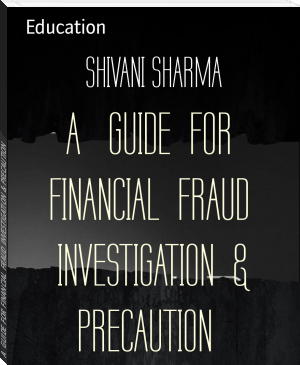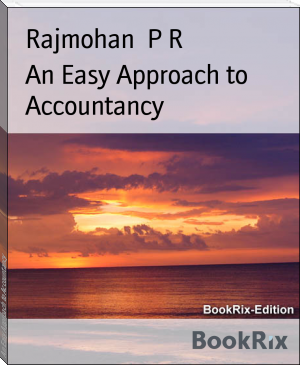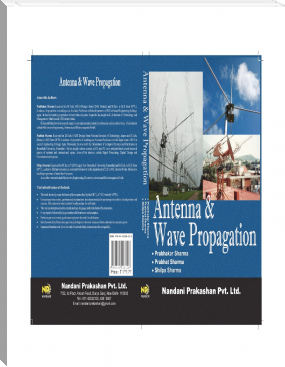A GUIDE FOR FINANCIAL FRAUD INVESTIGATION & PRECAUTION by SHIVANI SHARMA (books to read for beginners .txt) 📕

- Author: SHIVANI SHARMA
Book online «A GUIDE FOR FINANCIAL FRAUD INVESTIGATION & PRECAUTION by SHIVANI SHARMA (books to read for beginners .txt) 📕». Author SHIVANI SHARMA
3). CONVERSATION:- THIS IS THE LAST STAGE of triangle of fraud action. Conversation means the action of taking into possession of another man's money or property and converting or using them fraudulently for one use and benefit of or for the use and benefit of the third party to whom the property or money dose not belongs. It may take place when a person actually appropriates the property of another to his own beneficial use or enjoyment or to that of a third person who assets by the alteration of its nature. To constitute a fraudulent conversation there must not only be the intention to defraud but the intent must be accompainieshed by the acts of fraud.
STRATEGIES FOR FRAUD PREVENTION IN YOUR BUISSNESS
EMPLOYEES FRAUD IS A SIGNIFICANT PROBLEM FACED BY organizations of all types , sizes, location and industries. While we could all like to belive our employes are loyal and working for the benefit of the organitation, there are still many reason why your employees may commit fraud and several ways in which they might do it. Luckily , there are ways you can minimize fraud occurance by implementing diffrent procedures and controls .There are 6 strategies for fraud prevention in your buisness. They are as follow:
KNOW YOUR EMPLOYES. MAKE EMPLOYES AWARE/ SET UP REPORTING SYSTEM. IMPLEMENT INTERNAL CONTROL. MONITOR ATTENDENCE BALANCE. HIRE EXPERT6. LIVE THE CORPORATE CULTURER
CONCLUTION
1). KNOW YOUR EMPLOYEES:- Observing and listening to employees can help you identify potential fraud risk . It is important for management to be involve with their employees and take time to get to know them.Often , an attitude change clue you into a risk. This can also reveal internal issues that need to be addressed. For example, if an employee feels a lack of appreciation from the buisness owner or angerat their boss, this could lead him or her to commit fraud as a way of revenge. Any attitude change should cause you to pay close attention to that employee. This may not only minimize a better, more efficient place with happier employees.
2).MAKE EMPLOYEE AWARE
OR
SET UP REPORTING SYSTEM:- Awareness affects all employees. Everyone with in organization should be aware of the fraud and the consequences associated with them. Those who are planning to commit fraud will know that management is watching and will hopefully be deterred by this. Honest employees who are not tempted to commit fraud will also be aware of possible signs of fraud or theft. These employees are assets in the fight againts fraud.Since many employees are hestant to report incidents to their employers consider setting up an anonymous reporting system. Employees can report fraudulent activity through a website keeping their identity safe by using a tip online.
3).IMPLEMENT OF INTERNAL CONTROL:- Internal control are the plans or programs implemented to safegaurd your campany assets, ensure the integrity of its accountin records and deters and detect fraud and theft. The action of duties is an important component of internal control that can reduce the risk of fraud from occuring documentation is another internal control that can help reduce fraud. Internal control program should be monitored and reused an current with technological and other advances. If you do not have internal control process or fraud prevention program in place, then you should hire a professional with experiance in this area . An expert will analize the company's policies and procedurers, recommand appropriate programs and assist with implementation.
4).MONITOR ATTENDENCE SHEET:- You might be impressed by the employees who haven't missed a day of work in year while these may sound like loyal employees, it could be a sign that these employees have something to hide and are worride that someone will detect their wrong deeds if they were out of the office for a periods of time.It is also a good idea to rotate employees to various job within the company. This may aloso reveal fraudulent activity as it allow a second employee to rewiew the activities of the first.Some company also has the policy of that it is compulsory for employees to take 5 days or 10 days mandatory holidays. Its will help management in 2 ways: management cannot become dependent on any employee and if any employee refuces to take holiday then that means something is wrong.
5).HIER EXPERTS:- Certified fraud examiner (CFE), Certified public accountant (CPA) and CPAs who are certified in Financial forensic (CFF) can help you in establishing antifraud policies and procedures. These proffessional can provide a wide range of services from complete control audits and forensic analysis to general and basic consultation.
6). LIVE THE COOPORATE CULTURER:- A positive work enviroment can prevent employee fraud and theft . There should be a clear organizational structurer and fair employement practice. An open door policy can also provide a grate fraud prevention system as it gives employees open line of communication with the management. Buisness owner and senior management should lead by example and hold every employee accountable for their actions , regardless of position.
CONCLUSION:- Those who are willing to commit fraud do not discriminate. It can happen in large or small companies across various industries and geographic location. Occupational fraud can result in huge fraud financial loss, legal costs and ruined reputation that can ultimate lead to downfall of an organization. Having the proper plans in place can significantly reduce fraudulent activities from occuring or cut losses if a fraud already occured. Making the company policy known to employees is one of the best way to determin fraudulent behaviour.
PREVENTION OF MONEY LAUNDERING ACT 2002
PREVENTION OF MONEY LAUNDERING ACT 2002
1).ABOUT:- Money laundering is the process by which illegal funds and assets are converted into legilimate fund and asset. Money from illegal activities is deposited in numerous legimate accounts making it difficult to trace so the money can be used freely.
2).MEANING:- Money laundering is the process of creating the appearance that large amounts of money obtained from criminal activity, such as drug trafficking or terrorist activity, originated from a legitimate source. The money from the illicit activity is considered dirty, and the process "launders" the money to make it look clean.
3).STAGES:- Money laundering is essential for criminal organizations who wish to use illegally earned money effectively. Dealing in large amounts of illegal cash is inefficient and dangerous. The criminals need a way to deposit the money in financial institutions, yet they can only do so if the money appears to come from legitimate sources.
There are three stages or phases of money laundering placement, layering and integration
(1) PLACEMENT:-Its refers to the initial point of entry for funds deroived from criminal activities into the financial system.
(2) LAYERING;- Layering refers to the certain of complex network of transaction that attempt to blur the link between the initial entery point and the end of the laundering cycle. This stage can consists of multiple securites trades, cash transfer , currency exchange, the purchases of financial product such as life insurance etc.
(3)INTEGRATION:- INTEGRATION REFERS TO THE RETURNS OF FRAUD TO THE LEGIMATE ECONOMY.
4).MONEY LAUNDERING TATICS:- There are many ways to launder money, ranging from simple to complex. One of the most common ways to launder money is through a legitimate cash-based business owned by a criminal organization. For instance, if the organization owns a restaurant, it might inflate the daily cash receipts to funnel its illegal cash through the restaurant and into the bank. Then they can distribute the funds to the owners out of the restaurant's bank account. These types of businesses are often referred to as "fronts."
Another common form of money laundering is called smurfing, where a person breaks up large chunks of cash into multiple small deposits, often spread out over many different accounts, to avoid detection. Money laundering can also be done through the use of currency exchanges, wire transfers, and "mules" or cash smugglers, who smuggle large amounts of cash across borders to deposit them in offshore accounts where money-laundering enforcement is less strict. Other money-laundering methods involve investing in commodities such as gems and gold that can be easily moved to other jurisdictions, discretely investing in and selling valuable assets such as real estate, gambling, counterfeiting and creating shell companies.





Comments (0)